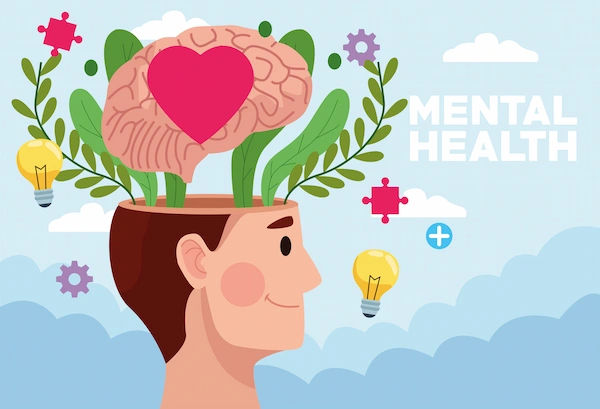Guide to Mental Health Perspective On Infidelity
Explore the mental health perspective on infidelity. Learn about betrayal trauma, the neuroscience of cheating, emotional responses for both partners, underlying causes, and the psychology behind healing.

Written by Dr. Siri Nallapu
Reviewed by Dr. Dhankecha Mayank Dineshbhai MBBS
Last updated on 13th Jan, 2026

Introduction
Discovering a partner's infidelity is a seismic event that shatters the foundation of trust and security. It's far more than a simple breach of agreement; it's a profound emotional and psychological wound. This article offers a crucial mental health perspective on infidelity, moving beyond judgment to explore the real impact on your mind and well-being. We will delve into the neuroscience of betrayal, the complex reasons affairs happen, and the challenging crossroads you may face. Most importantly, we will provide a compassionate roadmap for healing, whether you choose to rebuild the relationship or move forward on your own. Your mental health is the priority, and understanding this experience through a clinical lens is the first step toward reclaiming your peace.
Consult a Psychiatrist for the best advice
The Immediate Aftermath: Understanding Betrayal Trauma
The discovery of infidelity often triggers a response clinically recognised as betrayal trauma. This isn't just sadness; it's a form of acute stress that mirrors the symptoms of post-traumatic stress disorder (PTSD). Your world suddenly feels unsafe and unpredictable. You may experience intrusive thoughts about the affair, hypervigilance regarding your partner's actions, severe anxiety, and mood swings. It's crucial to normalise these reactions. You are not overreacting; your nervous system is responding to a genuine threat to your primary attachment bond.
The Neurobiology of Betrayal: Your Brain on Betrayal
Why does infidelity hurt so physically? The answer lies in your brain. fMRI studies show that the same regions activated during physical pain—the anterior cingulate cortex and insula—light up when someone experiences social rejection or betrayal. The brain also releases stress hormones like cortisol and adrenaline, leading to symptoms like insomnia, loss of appetite, and an inability to concentrate. Understanding this psychological impact of cheating from a biological standpoint can help you be kinder to yourself. Your body is literally in a state of shock and high alert.
Common Emotional and Psychological Responses
For the Betrayed Partner: Shock, Grief, and PTSD
The emotional rollercoaster for the betrayed partner is intense. It often begins with shock and denial, followed by agonising pain, anger, and obsessive rumination. This can evolve into a prolonged period of grief—not just for the relationship you thought you had, but for the loss of your future dreams. Many individuals report classic PTSD symptoms: flashbacks, nightmares, and avoidance of triggers associated with the affair. This is a natural response to an unnatural event, and acknowledging it is key to healing from betrayal trauma.
For the Unfaithful Partner: Guilt, Shame, and Confusion
The unfaithful partner's experience, while different, is also fraught with difficult emotions. Overwhelming guilt (for the hurt caused) and toxic shame (the feeling of being a bad person) are common. They may also feel confused, torn between their attachment to their partner and the complex feelings involved in the affair. Some may experience relief if the affair was an exit strategy from an unhappy relationship, which then brings its own guilt. Managing these emotions is critical for both individual mental health and any potential reconciliation.
Why Did It Happen? Looking Beyond the Obvious
To navigate the mental health perspective on infidelity, we must explore the "why." Seldom is infidelity solely about sex or a simple lack of willpower. It's often a symptom of deeper, unresolved issues.
Common Underlying Factors Contributing to Infidelity
Individual Factors: Unaddressed mental health issues like depression, anxiety, or narcissistic traits. A history of childhood trauma or attachment wounds can play a significant role.
Relational Factors: A severe breakdown in communication, prolonged emotional disconnection, unmet emotional needs, and unresolved chronic conflict.
Situational Factors: Life transitions (midlife crisis, parenthood), opportunity, and excessive alcohol use can lower inhibitions.
It's Never Simple: The Complex Interplay of Reasons
Rarely does one factor alone cause infidelity. It's usually a perfect storm of individual vulnerability, relational deterioration, and situational opportunity. For example, a person feeling lonely and undervalued in their marriage (relational) who is also struggling with low self-esteem (individual) may be more susceptible to the attention of a coworker (situational). Understanding this complexity is not about making excuses but about moving from a place of black-and-white judgment to a more nuanced understanding, which is essential for any meaningful resolution. If you are struggling to understand your own motivations or emotional state, consulting a therapist online with Apollo24|7 can provide a confidential space for exploration.
Conclusion
Viewing infidelity through a mental health perspective allows us to replace pure blame with understanding—not of the act itself, but of the profound human complexity behind it. This journey is undoubtedly one of the most painful you may ever face. It challenges your sense of self, your trust in others, and your view of the world. However, within this storm lies an opportunity for immense personal growth. By acknowledging the trauma, seeking professional support, and prioritising your well-being, you can navigate this crisis. You can emerge not just as you were, but with deeper self-knowledge, stronger boundaries, and a renewed understanding of what you need and deserve in relationships. Your story is not over; this chapter, however difficult, is about healing and reclaiming your life. If the emotional burden feels too heavy to carry alone, consider consulting a therapist online with Apollo24|7 to get professional guidance tailored to your situation.
Consult a Psychiatrist for the best advice
Consult a Psychiatrist for the best advice

Dr. Naga Bandikatla Nandini
Pediatric Psychiatry
11 Years • MBBS, MRCP, Psych, MBA
Hyderabad
Apollo Hospitals Jubilee Hills, Hyderabad

Dr. Vidit Singh
Psychiatrist
7 Years • MD, DNB (Psychiatry)
Lucknow
Apollomedics Super Speciality Hospital, Lucknow

Dr. Radhakanth Chunduri
Psychiatrist
30 Years • MD (Psych), DPM
Chinagadila
Apollo Hospitals Health City Unit, Chinagadila
(250+ Patients)

Dr. Jinesh Shah
Psychiatrist
20 Years • MBBS, MRCPsych (UK), CCT in Adult Psychiatry (UK), CCT in Child and Adolescent Psychiatry (UK), PG Diploma in Clinical Psychiatry (UK), Cert Hypnotherapy (UK).
Ahmedabad
Apollo Speciality hospital, Ahmedabad, Ahmedabad
(150+ Patients)

Dr. Manjunath H
Psychiatrist
20 Years • MBBS, DPM
Bengaluru
Apollo Clinic, Indiranagar, Bengaluru
More articles from Mental Health
Frequently Asked Questions
1. Can infidelity cause PTSD?
Yes, many betrayed partners experience symptoms that align with post-traumatic stress disorder (PTSD), a condition sometimes specifically referred to as betrayal trauma. This can include flashbacks, severe anxiety, hypervigilance, and intrusive thoughts about the affair.
2. What is the difference between guilt and shame for the unfaithful partner?
Guilt is the feeling of 'I did something bad.' It's focused on the behavior and can be a motivator for apology and change. Shame is the feeling of 'I am bad.' It's a toxic, global self-assessment that often leads to hiding, defensiveness, and avoidance. Effective recovery requires moving from shame to guilt.
3. Is couples therapy always necessary after infidelity?
Not always. While immensely valuable for many couples, the primary focus must first be on individual therapy. Both partners need to stabilise their own mental health and understand their role in the relationship dynamics before productive couples work can begin.
4. How long does it take to get over the pain of being cheated on?
There is no universal timeline. Healing from betrayal trauma is a personal process that can take months or even years. The goal isn't to 'get over it' as if it never happened, but to integrate the experience and learn to live with it in a way that no longer controls your life.
5. Can a relationship ever truly recover from infidelity?
Many relationships not only recover but become stronger and more authentic. However, this requires the unfaithful partner to end the affair, be completely transparent, take full responsibility, and practice patience. The betrayed partner must eventually choose to be vulnerable again. Success hinges on sustained effort from both people and often, professional guidance.

.webp)


